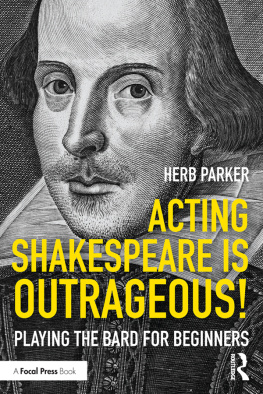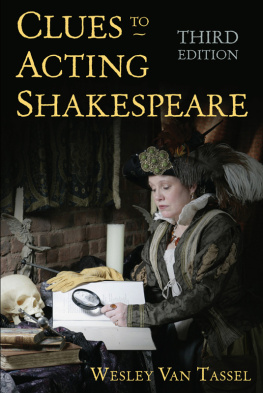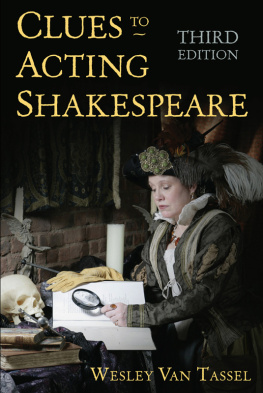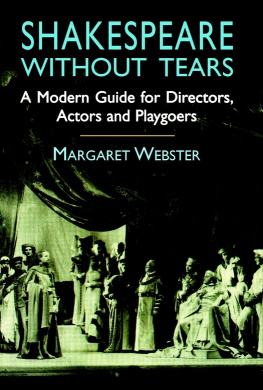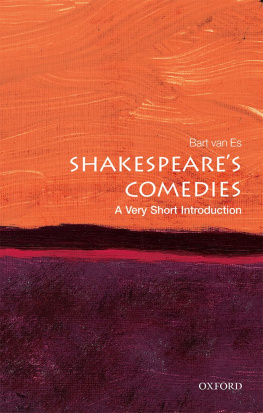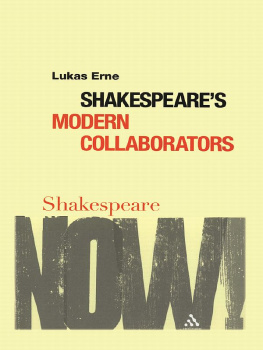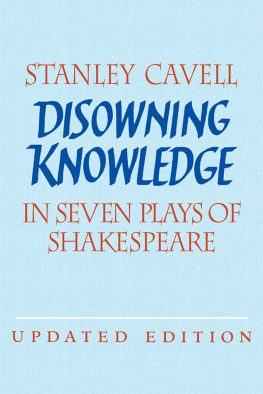ACTING SHAKESPEARE IS OUTRAGEOUS!
Performing the work of William Shakespeare can be daunting to new actors. Author Herb Parker posits that his work is played easier if actors think of the plays as happening out of outrageous situations, and remember just how non-realistic and presentational Shakespeare's plays were meant to be performed. The plays are driven by language and the spoken word, and the themes and plots are absolutely out of the ordinary and fantasticthe very definition of outrageous. With exercises, improvisations, and coaching points, Acting Shakespeare is Outrageous! helps actors use the words Shakespeare wrote as a tool to perform him, and to create exciting and moving performances.
Herb Parker is an Associate Professor in the Department of Communication and Performance, Theatre and Dance, with East Tennessee State University. Directing credits at ETSU include Othello, Race, The Trojan Women, Six Characters in Search of an Author (KCACTF Excellence in Directing Meritorious Achievement Award), Caesar 2012 (his adaptation of Julius Caesar), Cat on a Hot Tin Roof, As You Like It, Hamlet, A Midsummer Night's Dream (KCACTF Excellence in Directing Meritorious Achievement Award) and Little Shop of Horrors (also a KCACTF Excellence in Directing Meritorious Achievement Award recipient). Professor Parker is a long-time member of the Actors Equity Association. He is the author of A Monologue is an Outrageous Situation! How to Survive the 60-Second Audition, published by Focal Press in 2016.
ACTING SHAKESPEARE IS OUTRAGEOUS!
PLAYING THE BARD FOR BEGINNERS
Herb Parker

First published 2017
by Routledge
711 Third Avenue, New York, NY 10017
and by Routledge
2 Park Square, Milton Park, Abingdon, Oxon OX14 4RN
Routledge is an imprint of the Taylor & Francis Group, an informa business
2017 Taylor & Francis
The right of Herb Parker to be identified as the author of this work has been asserted by him in accordance with sections 77 and 78 of the Copyright, Designs and Patents Act 1988.
All rights reserved. No part of this book may be reprinted or reproduced or utilized in any form or by any electronic, mechanical, or other means, now known or hereafter invented, including photocopying and recording, or in any information storage or retrieval system, without permission in writing from the publishers.
Trademark notice: Product or corporate names may be trademarks or registered trademarks, and are used only for identification and explanation without intent to infringe.
Library of Congress Cataloging in Publication Data
Names: Parker, Herb, 1954 author.
Title: Acting Shakespeare is outrageous! : playing the bard for beginners / Herb Parker.
Description: New York : Routledge, 2017. | Includes bibliographical references and index.
Identifiers: LCCN 2017002782| ISBN 9780415790444 (hbk : alk. paper) | ISBN 9780415790970 (pbk : alk. paper) | ISBN 9781315212692 (ebk)
Subjects: LCSH: Shakespeare, William, 15641616Dramatic production. | Acting.
Classification: LCC PR3091 .P35 2017 | DDC 792.95-dc23
LC record available at https://lccn.loc.gov/2017002782
ISBN: 978-0-415-79044-4 (hbk)
ISBN: 978-0-415-79097-0 (pbk)
ISBN: 978-1-315-21269-2 (ebk)
Typeset in New Baskerville
by Florence Production Ltd, Stoodleigh, Devon, UK
For my brother
Harold
And in memory of
Our Sister,
Pat
How easy is a bush supposed a bear!
A Midsummer Night's Dream
CONTENTS
Once again I am grateful to Focal Press and Routledge for invaluable assistance in making this book possible, especially Stacey D. Walker, Meredith Darnell, Kristina Siosyte, and Neil Dowden. In addition I want to thank Denice Hicks, Artistic Director of Nashville Shakespeare Festival, Jere Hodgin, and Dr. Robert W. Sawyer, Professor in the Department of Literature and Language, East Tennessee State University.
No profit grows where is no pleasure taen;
In brief, sir, study what you most affect.
(The Taming of the Shrew)
By all rights the acting of Shakespeare is very simple: you learn the lines and you get up on your feet and you do it. Arguably this is all he is asking of you. He has provided no long essays explaining the meaning of his great plays, he has not inserted voluminous stage directions or prologues such as you might find with George Bernard Shaw and Eugene ONeill, and the only possible clues in acting his work that he himself has given you are those spoken by Hamlet in his advice to the players:
Speak the speech, I pray you, as I pronounced it to you, trippingly on the tongue: but if you mouth it, as many of your players do, I had as lief the town-crier spoke my lines. Nor do not saw the air too much with your hand, thus, but use all gently; for in the very torrent, tempest, and, as I may say, the whirlwind of passion, you must acquire and beget a temperance that may give it smoothness. O, it offends me to the soul to hear a robustious periwig-pated fellow tear a passion to tatters, to very rags, to split the ears of the groundlings, who for the most part are capable of nothing but inexplicable dumb shows and noise: I would have such a fellow whipped for oerdoing Termagant; it out-herods Herod: pray you, avoid it. Be not too tame neither; but let your own discretion be your tutor: suit the action to the word, the word to the action; with this special observance, that you oerstep not the modesty of nature: for anything so overdone is from the purpose of playing, whose end, both at the first and now, was and is, to hold, as twere, the mirror up to nature; to show virtue her own image, scorn her own image, and the very age and body of the time his form and pressure.
(Hamlet, Act III, Scene 2)
I cannot top that. But I am not trying to. What I hope to do is offer a few ideas for you to consider if when picking up a Shakespeare monologue or scene you are moved to ask yourself either, What do I do now? or What was that again: iambic what? I am guessing that this is not the first book on acting Shakespeare you will read, and I certainly hope it will not be the last; it shouldnt be. Perhaps you have already had the opportunity to act in one of his plays, though its quite all right if you havent. Nothing I have to say is intended to be be-all, or end-all. I am just sharing with you discoveries from some of my own struggles in working with him, both on stage as an actor and off stage as director and teacher. My hope is that if you love him as much as I do, and if you have been blessed to experience him as often as I have, some of these tips may be of use to you.
Lets say you have been handed a Shakespeare monologue or scene to perform. If you have never done this before you might be wondering how to do it; maybe your previous experience was always in a contemporary play, a play written in your own language much easier to understand. With Shakespeare you might wonder how you will be able to do it and you may be thinking that it is not possible for you to do it, that it is just too far from your ken, too removed from your own personal experience. After all, you are not British, and its possible you have never even been to England. What might seem so daunting at first is the languagethe poetry, page-long stanzas of verse, intermittently interrupted by blocks of what looks like prose. And those strange

